In 1955 top noir director Jules Dassin made top serious heist drama Rififi on a budget of sod all, and stormed Cannes with it, mainly thanks to the lengthy, elaborate and near-silent sequence at the centre of the film where the jewel robbery is taking place. Americans, as is their wont, started copying it. The copies became gradually more outlandish and overblown until, with the dawning of the ‘60s, that unique film genre with almost no connection to criminal reality, the caper comedy, was born.
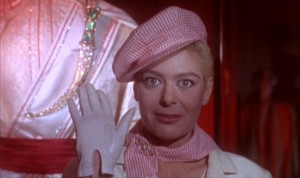 |
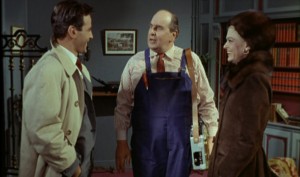 |
The rules of this genre faithfully followed Dassin’s original dress pattern. Start with the assembling of the gang (a rag-tag band of misfits each with a special skill, preferably), move on through outlining of the plot and training, and build up to the (hopefully) ingenious, suspenseful and showstopping heist itself, before rounding things off with a ‘best laid plans’ coda where it all goes horribly wrong. When it works, it works like nothing else in cinema. There’s nothing like watching an immensely satisfying harebrained scheme being carried out like clockwork, allowing the audience to root for a bunch of unreconstructed career criminals (violence, tellingly, is rarely used), before hypocritically switching to a ‘yes of course, well they had it coming’ position when the fall inevitably arrives. The spectator gets to feel part of this hyper-smart gang, while enjoying the diplomatic immunity conferred by their ticket stub, and a deeply satisfying cake is had and eaten in the stalls.
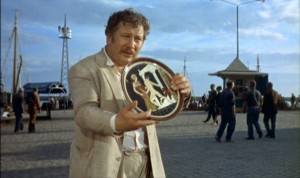 |
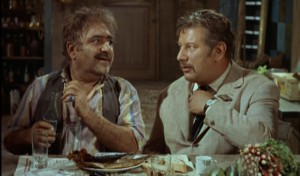 |
Dassin, understandably, felt he wasn’t getting his due for starting the whole ball rolling more or less single-handedly. What to do? Write a sniffy article in Cahiers Du Cinema rubbishing his imitators? Withdraw pompously from making films altogether and take up Macramé instead? No, he decided to beat the caper copyists at their own game. And Topkapi is probably the most eloquent “Look mate, if you’re going to rip me off, this is how you should do it” riposte in the history of film.
Saucepot Greek jewel forger (and future Mrs Dassin) Melina Mercouri hooks up with her ex-squeeze, scheming criminal genius Maximilian Schell, to nick a Sultan’s priceless emerald-inlaid dagger from a museum in the titular Turkish locale. Along the way they recruit foppish gadget maverick Robert Morley, a circus strongman and a ‘my body is my tool’ acrobat-cum-mime. A sound gang, but when they look for an arms courier the best they can find is small-time con man Peter Ustinov.
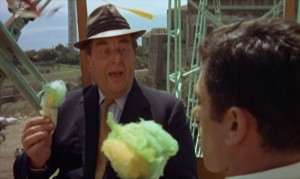 |
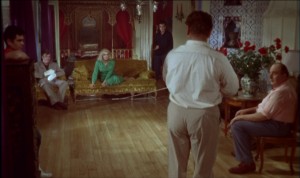 |
The Turkish police get wind of something fishy when they catch Oosti-Boosti at the border with a load of grenades, so enlist him to spy on Schell’s gang from the inside, which of course is a rubbish thing to do as he’s a bumbling fool who knows damn all about what’s going on, and has to fight off the amorous intentions of a deranged chef who keeps popping up for no concrete reason at all, before an accident forces him reluctantly into the strongman role, and the heist is on.
From the broad comedy of the early scenes, through the occasional longeur (the romantic banter twixt Schell and Mercouri falls mighty flat), we’re treated to a slow, steady build-up to the inevitable climax, with the odd pitfall followed by ingenious change of tactics along the way, as per genre regulations. This being the ‘60s, there’s also lashings of travelogue-style footage of Turkish locales (bazaars, docks, mosques, and a decidedly odd mass oiled-up wrestling tournament) – all exquisitely photographed.
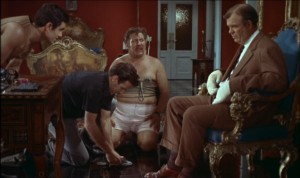 |
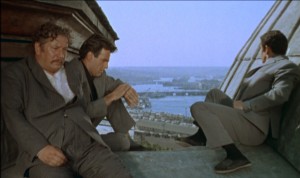 |
The forty minute, near-wordless heist is not only gag-packed, but truly nail-biting. While Mercouri, Morley and a mechanical parrot distract the guards, the intrepid trio scamper across museum rooftops in a vertiginously filmed sequence that makes the viewer almost as queasy as height-fearing Ustinov. Then Schell and Usters brace themselves at the top of the rope while the acrobat’s lowered through a window and down onto the display case via an elaborate pulley system, to avoid setting off the pressure-sensitive floor alarm. It’s a brilliantly ingenious excuse for high-wire acrobatics and heart-stopping slip-ups, and naturally it’s been cheerfully ripped off countless times by productions including, in descending order of merit: an episode of Thunderbirds, Herbie Goes to Monte Carlo, and Mission: Impossible. But they needlessly tarted it up with noise and orchestral scores, whereas Dassin chooses this point to cut the film back to bare bones: silent chambers, anguished grimaces, the creak of the rope, and most importantly, no incidental music whatsoever.
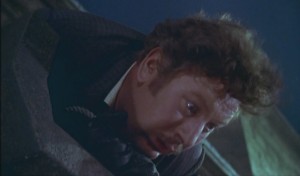 |
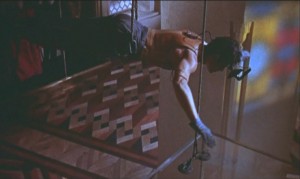 |
The performances, admittedly, are not all so breathtaking. Schell’s phoning his act in from the suave exchange, and Mercouri’s on hands-free from the Blackwall Tunnel – she’s supposed to be a criminal legend-cum-impetuous nymphomaniac, but sub-Eartha Kitt come hither purring is as well-developed as that gets. Fortunately the Brits come through with the goods – Morley’s eccentrically childlike gadget lover could have been written for, even by, him.
Ustinov’s hapless Arthur Simpson, however, is another matter. It’s common practice to make the bumbling liability in any criminal gang the broadest of broad comic turns – think Benny Hill’s ‘big lady’-mad prof in The Italian Job. Ustinov could’ve done that in his sleep, but instead goes in entirely the other direction, and hits on a mumbling, realistic way of speaking (in a soft midlands accent) which seems on another planet from Mercouri and Schell’s stilted continental slickness, which as they’re meant to be worlds apart anyway is entirely appropriate. Thus the bumbling comic relief is elevated to key figure and focus of audience sympathy – Dassin gleefully trampling all over one of the sacred rules of the genre he unwittingly helped create.
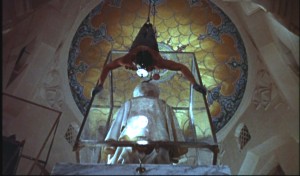 |
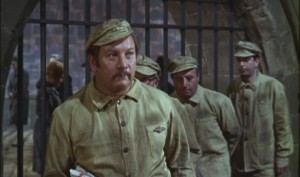 |
Ustinov was originally offered the Clouseau role in The Pink Panther about the same time Peter Sellers landed Simpson in Topkapi, but they both turned them down and ended up swapping jobs. Peter U then won the ’65 supporting role Oscar while Pete S lucked out of the starring role award for Dr Strangelove the same year. Ustinov promptly installed his gong in the lav. Nice one, Arthur.



















